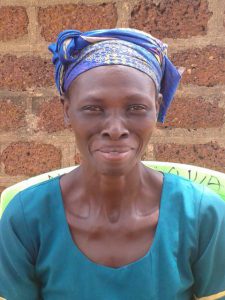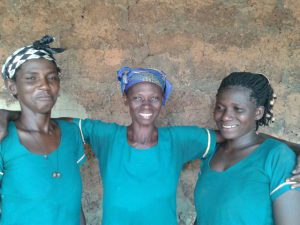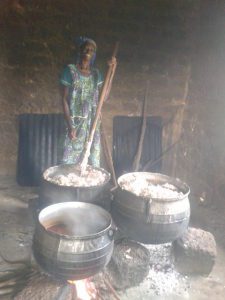Mary is a lean, strong looking woman with a twinkle in her eye that makes it difficult to determine her age. Her parents died when she was young and she went to live with an older brother in Accra. She didn’t get the chance to go to school. Instead learnt how to cook and has been cooking all her life. As a teenager she lived in Techiman and made and sold ‘tuopame’, a breakfast item made from beans, until she met her husband and moved back to Lawra. Now she is a cook for the ATE Karbo Primary School feeding programme.
Though Mary falls outside of the 46% national literacy rate among women in Ghana, she is committed to doing her part to support and ensure quality education for the children at Karbo Primary. As a member of the Parent Teacher Association (PTA) she would come to the school on the pretext of selling groundnuts to monitor teachers’ attendance, whether they were teaching or not and report back. She explains that she has seen a big difference between her first observations seven years ago and now. The students were performing poorly and initially she thought that it was down to the teachers but then realised that the children also seemed dull. Since then, gradually the teachers have been reshuffled and now with the feeding programme Mary assesses that the children are attending school and learning better. Mary says that “through preparing delicious and nutritious meals it has made the children healthier and they always want to come to school”.
Mary has four children, two have gone through Karbo JHS and two are here at Karbo Primary School. Mary tells how her son Kaabaarib in P6 and her daughter Tuoreme in P3 haven’t always done well at school. Tuoreme had to repeat P1 though she learnt from this and has since sailed through whilst Kaabaarib used to be reluctant to come to school but now Mary sees lots of kojos (ticks) and knows that he is performing really well. She takes education very seriously and though when she was young there were challenges to her going to school, she is proud that she can now advise and encourage her own children to study and do well.
She explains that in the traditional homes mostly the families will get an evening meal and eat it all so there will be none left over for breakfast. Through the ATE feeding programme, Mary and her children are able to eat a midday meal. In her home, she says that she is the man of the house, using her wages from the school and selling groundnuts after work to support her family. She lives with her husband, his parents, his brothers and her children and she works hard in the house. The fact that ATE provides for the needs of her children’s education has really lessened her work in having to pay for the things they need.
By Leela Shanti and Diedong Eric


